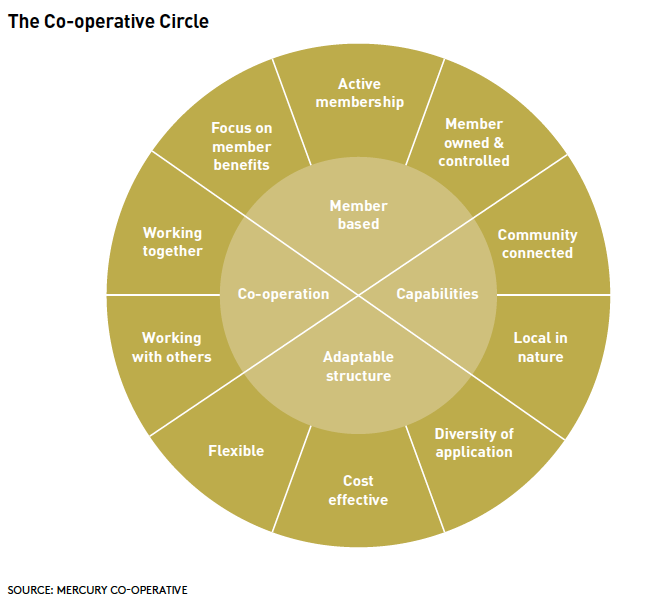PART ONE: UNDERSTANDING CO-OPERATIVES
What are co-operatives?
The most important aspect of co-operatives is people. Co-operatives belong to, are operated by, and benefit the people who join them. They also enhance the communities they operate in.
Members are the heart and soul of a co-operative. The main purpose of a co-operative is for members to share in the benefits of co-operation to meet social, economic and cultural needs. Members might be in a particular geographical community or might simply have a common business or social interest.
Co-operatives are people-centred. They are owned, controlled, used and invested in by their members. Members have a responsibility to support their co-operative by being actively involved and, in return, the co-operative must ethically serve the needs of its members.
Co-operatives are democratic. All members are equal decision-makers, with one vote per member, enabling members to determine the decisions their co-operative makes.
Co-operatives promote member development through their participation in governing the organisation, and usually provide local social or economic development, such as providing employment, goods or services that would not otherwise be available or affordable to the members.
THE BASICS
A co-operative is a business or organisation owned and controlled by its members who can be customers, staff, suppliers, local residents or a combination of these stakeholders.
Members have an equal say in how the co-operative is run. Members choose what to do with profits, whether distributing among members, reinvesting in the business or giving to the community.
Co-operatives promote member development through their participation in governing the organisation, and usually provide local social or economic development, such as providing employment, goods or services that would not otherwise be available or affordable to the members.
A co-operative’s size and operations depend on the extent of support from its members, including capital contributed, members’ use of the co-operative’s goods and services, and the involvement and skills of the Board.
Co-operatives are important to our economy and communities, and operate in a wide range of industries. They represent a socially responsible form of business enterprise because their focus is not on maximising profits for other investors, but on maximising benefits through the provision of goods or services to members. The members may be in a particular geographical community or they may simply have a common business or social interest.
The ability of a co-operative to operate with the purpose of making a profit in any market along with flexibility in how it uses its surplus makes the co-operative adaptable to a broad range of business and social (including charitable) purposes. The democratic control and protections guaranteed by legislation make a co-operative less exposed to takeovers by profit-seekers who are not part of the membership or community that the co-operative serves.
The values and principles of the co-operative sector, particularly the value of solidarity and the principle of co-operation amongst co-operatives, means that any co-operative can find support and advice from other co-operatives. This is a stark contrast to other corporate entities that treat each other as competitors in a race for maximum profits.
Competition in a market, and indeed competition between individual members in a co-operative, can result in conflict and an erosion of benefits for a co-operative and its members. Consequently, adherence to the internationally agreed principles for co-operatives is core to the success of a co-operative and the sector to achieve a socially responsible business world.

